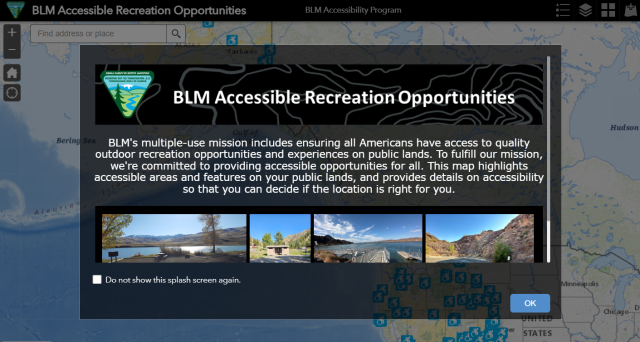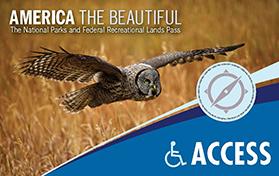
BLM Accessibility Program
The BLM is dedicated to ensuring that everyone has an equitable opportunity to access their public lands by providing access to facilities, programs, services, and activities for people with disabilities. The information below provides details on opportunities, resources, laws, policies, and guidelines.
- Veterans with Disabilities
The BLM commitment to providing accessible recreational opportunities includes those injured while serving in the military.
Most of the work the BLM does with veterans groups is at the local District or Field Office level. The BLM works with non-profit groups, guided outfitters, and veterans organizations in coordinating a number of recreational opportunities and events for veterans and their families. Several events include the annual Veterans Family Fishing Classic at Jupiter Inlet Lighthouse and the Palm Beach Veterans Wheelchair Accessible Boat Fishing events in Florida and a whitewater rafting trip on the Colorado River through Westwater Canyon in eastern Utah.
The BLM works with many organizations that focus on helping disabled individuals and veterans experience the proven benefits of participating in outdoor activities. These groups include:
- Project Healing Waters (Fly Fishing)
- Disabled Sports USA (Warfighter Sports program)
- FishingCommunity.Org (Fisheries for Veterans Project)
- Wilderness Inquiry, Inc. (Inclusive Outdoor Adventures)
- Access Pass
An America the Beautiful – Access Pass is your ticket to more than 2,000 federal recreation sites throughout the United States.
Cost: Free
Available to: U.S. citizens or permanent residents with permanent disabilities. Applicants must provide documentation of permanent disability and residency or citizenship.
How to Obtain:
- Online - through the USGS Store.
- In person at a federal recreation facility.
- By mail using this application form (PDF) *Note: the cost of obtaining an Access Pass through the mail is $10 for processing the application – the pass is free.
Required Documentation: Applicants are required to show one of the following forms of documentation to establish proof of permanent disability:
(1) A statement signed by a licensed physician attesting that the applicant has a permanent physical, mental, or sensory impairment that substantially limits one or more major life activity and stating the nature of the impairment; or
(2) A document issued by a Federal agency, such as the Veteran’s Administration, which attests that the applicant has been medically determined to be eligible to receive Federal benefits as a result of blindness or a permanent disability. Other acceptable Federal agency documents include proof of receipt of Social Security Disability Income (SSDI) or Supplemental Security Income (SSI) due to disability; or
(3) A document issued by a State agency, such as the vocational rehabilitation agency, which attests that the applicant has been medically determined to be eligible to receive that agency’s benefits or services as a result of medically determined blindness or permanent disability. Showing a State motor vehicle department disability sticker, hangtag, or license plate is not acceptable documentation because those items do not identify the individual to whom that disability related permit is issued.
Additional information:
- The Access Pass admits the Pass owner and any passengers traveling with the owner in a non-commercial vehicle at per-vehicle fee areas or the Pass owner and three additional adults where per-person fees are charged.
- The Access Pass may also offer a discount on some expanded amenity fees, such as camping, boat launching, swimming, and specialized interpretive services.
- Discounts offered by the Pass vary widely across the many different types of recreation sites. Pass owners are encouraged to check with sites they plan to visit before obtaining a pass to verify that the site accepts the Access Pass.
- The Pass holder must show photo identification anytime a Pass is used.
- The Access Pass generally does NOT cover or reduce special recreation permit fees or fees charged by concessioners.
- A permanent disability is defined by 29 U.S.C. 705(20) as a permanent physical, mental, or sensory impairment that substantially limits one or more of the person’s major life activities, such as caring for oneself, performing manual tasks, walking, seeing, hearing, speaking, breathing, and learning.
- Accessibility Laws
Several federal laws guide the BLM’s accessibility program – including the Architectural Barriers Act of 1968, the Rehabilitation Act of 1973, and the Americans with Disabilities Act of 1990.
- Accessibility Standards
The U.S. Access Board is a federal agency that promotes equality for people with disabilities through leadership in accessible design and the development of accessibility guidelines and standards for the built environment, transportation, communication, medical diagnostic equipment, and information technology. The Board acknowledges that achieving accessibility in outdoor environments can be difficult due to challenges and constraints posed by terrain, the degree of development, construction practices and materials, and other factors.
The Access Board has issued requirements that are part of the Architectural Barriers Act (ABA) Accessibility Standards. These Standards address newly built or altered trails, picnic and camping areas, viewing areas, beach access routes, and other components of outdoor developed areas on federal sites. The guide is available as a pdf document: Outdoor Developed Areas: A Summary of Accessibility Standards for Federal Outdoor Developed Areas (7Mb).
- Accessibility Principles and Elements
The BLM manages its accessibility program from the national office, with collateral-duty accessibility coordinators in state offices. The guiding principles of the BLM’s Accessibility Program are:
- Equal Opportunity – Provide equity for participation in programs and activities.
- Independence – Provide for independent and safe participation through the highest level of accessibility.
- Dignity – Ensure the dignity of the participant. Accessibility is the concept of choice, but it is choice with dignity.
- Integration – Provide for the inclusion of people of all abilities; not segregation with separate activities.
- Compliance – Comply with the “spirit” of accessibility legislation and regulations, as well as the “letter” of the law.
- Universal Design – Adhere to the principles of Universal Design in all planning, design, and construction activities.
Key elements of the BLM’s Accessibility Program include:
- Coordination and cooperation with other Federal agencies and partners;
- Systematic accessibility evaluations of developed recreation sites;
- Technical assistance to BLM field offices on accessibility issues;
- Developing action plans for corrective actions on assessed developed recreation sites;
- Accessibility training and education for field staff and managers; and
- Internal and external media and communication activities.


